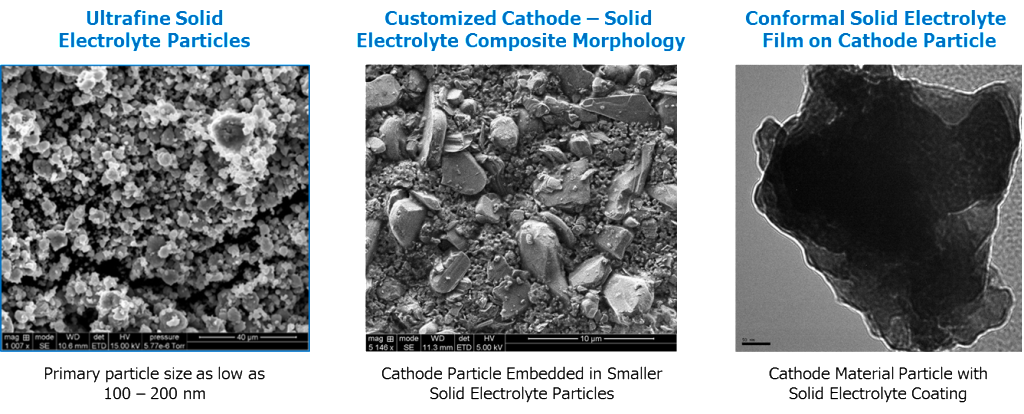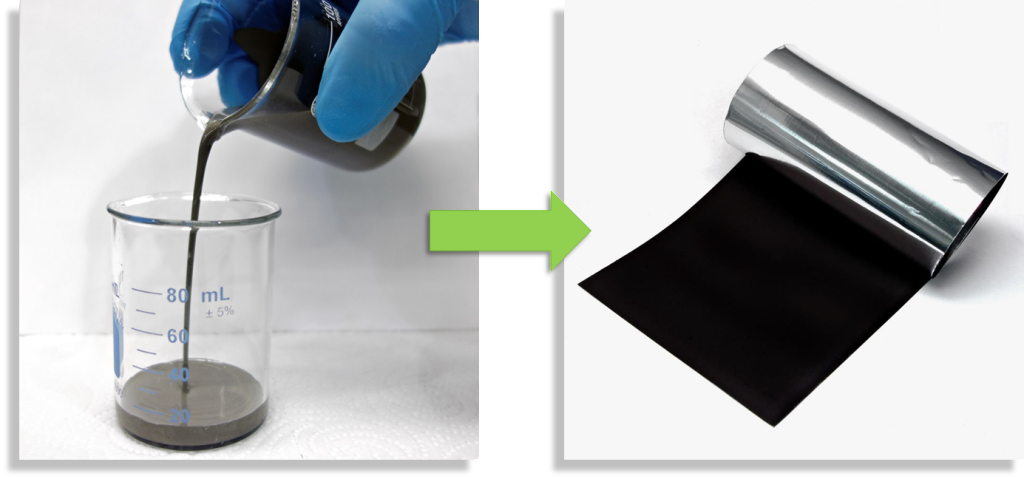NEI Introduces New Halide Solid Electrolyte (Li3InCl6)
October 15, 2024
NEI is pleased to now offer high-quality Lithium Indium Chloride (Li3InCl6) powders for research and development applications. This halide-based solid-state electrolyte (SSE) offers exceptional performance and versatility:
- Excellent Ionic Conductivity: Enables rapid ion transport, leading to faster charging and discharging rates in batteries.
- Low Electronic Conductivity: Minimizes self-discharge and enhances overall battery efficiency.
- Stability in Dry Air: Eliminates the need for a glovebox, simplifying handling and processing.
- Soft and Processable Powder: Easy to work with using mechanical techniques.
 Product Specifications:
Product Specifications:
- Color: Off white
- Phase Purity: ≥ 95%
- Crystal Structure: Monoclinic
- Molecular Weight: 348.35 g/mole
- Crystal Density: 2.56 g/cm3
- Ionic Conductivity: 1 to 5 x 10-3 S/cm (unsintered, cold-pressed pellet @ RT)
Technical Links:
View Specification Sheet (pdf) | View Safety Data Sheet (pdf)
Available Quantities:
Our Lithium Indium Chloride (Li3InCl6) is offered in powder form and available in quantities of 10 grams, 25 grams, 50 grams, 100 grams, 250 grams, 500 grams, and 1 kilogram. Request a quote today!
NEI Solid Electrolyte Materials
NEI produces a variety of other cutting-edge solid electrolytes for Lithium-ion and Sodium-ion batteries. Explore our expanding selection of sulfide, oxide, phosphate, polymer, NASICON, and now halide-based electrolytes too!
Custom Solutions
Looking for a particular material you can’t find? As a world leading developer and manufacturer of commercial and specialty materials for Lithium-ion and Sodium-ion batteries, NEI Corporation specializes in custom sythesizing hard to obtain compositions. We employ a scalable and economical solid-state synthesis process to produce battery materials with precise control over composition and particle structure. NEI works diligently with both battery developers and manufacturers to produce cathode, anode, and solid electrolyte materials for that are ideally suited for their application.
About NEI Corporation:
Founded in 1997, NEI develops, manufactures, and sells advanced specialty materials for a broad range of industrial customers around the world. The company’s core competencies are in designing, developing, and producing products that meet the specific application needs of its customers. NEI’s products, which are sold under the registered trademark NANOMYTE®, are backed by a suite of issued and pending patents. NEI’s commercial products include: Lithium-ion Battery Materials, Na-ion Battery Materials, Functional & Protective Coatings, and Specialty Nanoparticle-based products.
Beyond material production, NEI is a solutions provider. NEI is fully committed to customer success by helping to develop and implement solutions that drive their business forward through a variety of in-house materials development, characterization, and testing services. Our deep understanding of materials science allows us to collaborate closely with customers, ensuring seamless integration of our products into their applications.

 Product Specifications:
Product Specifications: We’re Expanding!
We’re Expanding!
 NEI Corporation develops, manufactures, and supplies Specialty Materials for diverse industrial applications. NEI employs a multi-disciplinary group of motivated scientists and engineers and is looking for qualified individuals to join our team.
NEI Corporation develops, manufactures, and supplies Specialty Materials for diverse industrial applications. NEI employs a multi-disciplinary group of motivated scientists and engineers and is looking for qualified individuals to join our team.
 About the Author:
About the Author: Somerset, New Jersey (USA) – Today, NEI Corporation announced customers can now order from an expanded selection of cathode, anode, and solid electrolyte materials for both
Somerset, New Jersey (USA) – Today, NEI Corporation announced customers can now order from an expanded selection of cathode, anode, and solid electrolyte materials for both 


 In addition to increasing the suite of materials being offered, NEI has developed new materials synthesis capabilities, which serve as demonstration stations for exploring new compositions that are difficult to produce using conventional processing. A case in point is precursor materials obtained from recovered nickel, cobalt and manganese salts from recycled lithium-ion batteries. The solution-precipitation setup, installed at NEI, serves as a test-bed to determine processing parameters for materials such as NMC532 and NMC622, or any mixed metal oxide for that matter.
In addition to increasing the suite of materials being offered, NEI has developed new materials synthesis capabilities, which serve as demonstration stations for exploring new compositions that are difficult to produce using conventional processing. A case in point is precursor materials obtained from recovered nickel, cobalt and manganese salts from recycled lithium-ion batteries. The solution-precipitation setup, installed at NEI, serves as a test-bed to determine processing parameters for materials such as NMC532 and NMC622, or any mixed metal oxide for that matter.
 and Samsung’s Galaxy Note 7 catching fire, which resulted in the recall of more than 1 million smartphones in 2016. The combustion is mainly due to leakage of the liquid electrolyte, or short-circuit of the electrodes caused by the failure of the polymer gel separator, which also contains liquid.
and Samsung’s Galaxy Note 7 catching fire, which resulted in the recall of more than 1 million smartphones in 2016. The combustion is mainly due to leakage of the liquid electrolyte, or short-circuit of the electrodes caused by the failure of the polymer gel separator, which also contains liquid.














